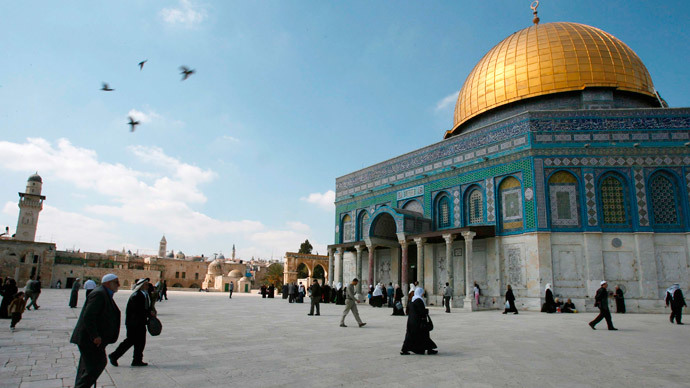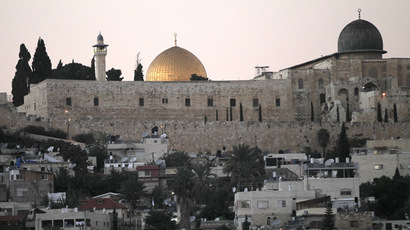Israel mulls bill to outlaw Muslim ‘guards’ at Al-Aqsa Mosque – report

Israel’s security authorities are pushing a bill that will outlaw Muslim ‘guards’ at Al-Aqsa mosque – a revered Muslim holy site on Temple Mount, which has been at the center of clashes between Palestinians and Israeli police, Haaretz reported.
The bill is being drafted on behalf of Public Security Minister Yitzhak Aharonovitch, the Israel Police and the Shin Bet security service, and has been introduced to Attorney General Yehuda Weinstein, according to the newspaper.
The guards targeted by the bill are men and women stationed near the Al-Aqsa mosque, the report claims. The mosque in Jerusalem is the third holiest site in Islam after Mecca and Medina. The guards are called “Mourabitoun” in Arabic – a term which is used to describe those who protect Muslim holy sites.
According to Haaretz, Israel’s security recently claimed that the guard is being partly funded by Gulf States, Islamist parties, and extremist groups in Israel.
Security officials also said they recently intercepted a courier at the Jordanian border who was carrying 1 million shekels (about $260,000). Police said the money was intended for the guards’ salary, estimated to be between 3,000 and 4,000 shekels ($776 - $1036).

Police Commissioner Yohanan Danino said blocking funding decreased tensions on Temple Mount, which is also the location of Jewish holy sites.
“We recently seized roughly a million shekels. We felt a drastic change on the Temple Mount in a matter of days, the numbers [of demonstrators] went down. I think it’s an effective way to deal with this phenomenon,” he said during a meeting of the Knesset Interior Committee on November 2.
The minister said “the smartest thing to do is to show how we’re stopping the funding.”
Violent clashes in front of Al-Aqsa mosque have intensified over the past months. Early in October, violence erupted between Palestinians and police after Israeli authorities placed restrictions on Al-Aqsa, only allowing Palestinians over the age of 50 to enter the site.
READ MORE: Clashes erupt in Jerusalem as Palestinians ‘denied’ access to holy mosque
Tensions frequently rise at this time of year, during the Jewish holiday of Sukkot, where Jews would historically make pilgrimages to Temple Mount. Non-Muslim visits to the Al-Aqsa complex are allowed and regulated by Israeli police, but Jews are not allowed to pray at the site.

For the past month, the holy site has been closed twice by Israeli authorities due to sporadic clashes. Israeli police closed it for the first time since 1967 in retaliation for the killing of a prominent right-wing Jewish activist. The second brief shutdown was triggered after violent clashes in the streets of East Jerusalem and the Old City between Palestinian youths and police.
READ MORE: Temple Mount closed to visitors 2nd time in week after Palestinians, police clash
Tension over the holy site was reignited in 2000, after Israeli politician Ariel Sharon’s visit triggered a Palestinian uprising, the so-called Second Intifada that lasted five years.
Currently the Old City, where the holy site is located, has been under Israeli jurisdiction since the 1967 Six-Day war. However, the mosque itself was left under the administration of the Jerusalem Islamic waqf (an Islamic trust). Muslims have been governing the holy site since the Muslim reconquest of Jerusalem in 1187. Israeli authorities have repeatedly stated that they are not planning to change the situation.
In November, Palestinian leader Mahmoud Abbas warned the Israeli government against changing the status quo at Temple Mount. He said that a global religious war could be triggered if Jews are allowed to pray on the Temple Mount in Al-Aqsa mosque.














